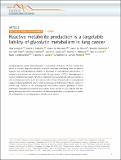| dc.contributor.author | Luengo, Alba | |
| dc.contributor.author | Abbott, Keene L. | |
| dc.contributor.author | Davidson, Shawn M. | |
| dc.contributor.author | Hosios, Aaron M. | |
| dc.contributor.author | Chan, Sze Ham | |
| dc.contributor.author | Freinkman, Elizaveta | |
| dc.contributor.author | Lewis, Caroline A. | |
| dc.contributor.author | Vander Heiden, Matthew G. | |
| dc.date.accessioned | 2020-04-08T13:24:46Z | |
| dc.date.available | 2020-04-08T13:24:46Z | |
| dc.date.issued | 2019-12 | |
| dc.identifier.issn | 2041-1723 | |
| dc.identifier.uri | https://hdl.handle.net/1721.1/124522 | |
| dc.description.abstract | Increased glucose uptake and metabolism is a prominent phenotype of most cancers, but efforts to clinically target this metabolic alteration have been challenging. Here, we present evidence that lactoylglutathione (LGSH), a byproduct of methylglyoxal detoxification, is elevated in both human and murine non-small cell lung cancers (NSCLC). Methylglyoxal is a reactive metabolite byproduct of glycolysis that reacts non-enzymatically with nucleophiles in cells, including basic amino acids, and reduces cellular fitness. Detoxification of methylglyoxal requires reduced glutathione (GSH), which accumulates to high levels in NSCLC relative to normal lung. Ablation of the methylglyoxal detoxification enzyme glyoxalase I (Glo1) potentiates methylglyoxal sensitivity and reduces tumor growth in mice, arguing that targeting pathways involved in detoxification of reactive metabolites is an approach to exploit the consequences of increased glucose metabolism in cancer. | en_US |
| dc.description.sponsorship | National Science Foundation (U.S.). Graduate Research Fellowship Program (Grant DGE-1122374)) | en_US |
| dc.description.sponsorship | National Science Foundation (U.S.). Graduate Research Fellowship Program (Grant T32GM007287) | en_US |
| dc.description.sponsorship | United States. Department of Defense. Peer-Reviewed Medical Research Program (Grant W81XWH-15-1) | en_US |
| dc.description.sponsorship | National Institutes of Health (U.S.) (Grant 01CA201276) | en_US |
| dc.description.sponsorship | National Institutes of Health (U.S.) (Grant 01CA168653) | en_US |
| dc.description.sponsorship | National Institutes of Health (U.S.) (Grant 30CA14051) | en_US |
| dc.language.iso | en | |
| dc.publisher | Springer Science and Business Media LLC | en_US |
| dc.relation.isversionof | 10.1038/s41467-019-13419-4 | en_US |
| dc.rights | Creative Commons Attribution 4.0 International license | en_US |
| dc.rights.uri | https://creativecommons.org/licenses/by/4.0/ | en_US |
| dc.source | Nature | en_US |
| dc.subject | General Biochemistry, Genetics and Molecular Biology | en_US |
| dc.subject | General Physics and Astronomy | en_US |
| dc.subject | General Chemistry | en_US |
| dc.title | Reactive metabolite production is a targetable liability of glycolytic metabolism in lung cancer | en_US |
| dc.type | Article | en_US |
| dc.identifier.citation | Luengo, Alba et al. "Reactive metabolite production is a targetable liability of glycolytic metabolism in lung cancer." Nature communications 10 (2019): s41467-019-13419 © 2019 The Author(s) | en_US |
| dc.contributor.department | Massachusetts Institute of Technology. Department of Biology | en_US |
| dc.contributor.department | Whitehead Institute for Biomedical Research | en_US |
| dc.contributor.department | Koch Institute for Integrative Cancer Research at MIT | en_US |
| dc.relation.journal | Nature communications | en_US |
| dc.eprint.version | Final published version | en_US |
| dc.type.uri | http://purl.org/eprint/type/JournalArticle | en_US |
| eprint.status | http://purl.org/eprint/status/PeerReviewed | en_US |
| dc.date.updated | 2020-01-30T17:04:46Z | |
| dspace.date.submission | 2020-01-30T17:04:48Z | |
| mit.journal.volume | 10 | en_US |
| mit.journal.issue | 1 | en_US |
| mit.license | PUBLISHER_CC | |
| mit.metadata.status | Complete | |
